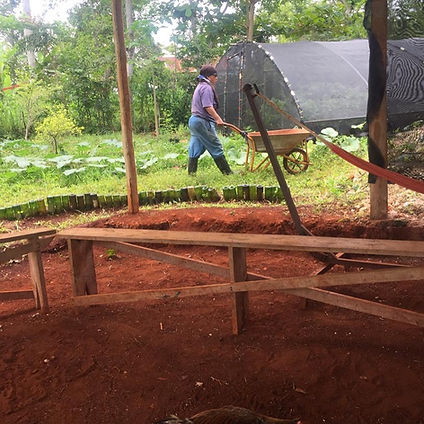top of page

Restoring the environment and addressing hunger
The Food Forest Project is a partnership between Cultural Capital Haiti and the local nonprofit organization OBEC (Organisation pour le Bien-Être de Cap-Rouge), which serves the rural region of Cap Rouge. Its goal is to support rich, sustainable livelihoods in one of Haiti’s most impoverished communities.
OBEC was co-founded by Nadine Dominique, a Haitian-born activist and permaculturist, as the next stage in her lifelong mission to revitalize traditional food growing systems and drive a renaissance of Haiti’s ancient forests. She is the daughter of Haitian civil rights leader Jean Dominique, subject of the celebrated documentary film The Agronomist, who was assassinated for his work in the year 2000. After stints living in Canada and Jamaica, Nadine put down roots in the hills of Cap Rouge, on land overlooking the Caribbean Sea. There, she began to expose the local population to forgotten pieces of their agricultural heritage, and to work with elders to preserve existing traditions that were in danger of being forgotten. Since that time, her land has grown into a hive of environmental action for the community.
In 2012, Nadine partnered with Rocky Paurice, a veteran agriculturalist and passionate sustainability educator. Rocky serves as OBEC’s Director of Operations, and in that capacity he coordinates and leads tree distribution, tree planting working groups, and local outreach. Together, Rocky and Nadine employ local workers and volunteers to accomplish all the tasks of a small farm and outdoor community education center –– from preparing compost, filling thousands of seed bags, and pruning the young trees, to leading workshops for children and listening sessions for elders.
They concentrate on food trees which are on the verge of local extinction, and on deep-rooting canopy trees which have the capability to bring groundwater to the surface.
Among the deep-rooting canopy species which form the pillars of OBEC’s emerging food forest are the Mayan nut tree –– locally called chokogou (“chocolate taste”) due to the flavor of its highly nutritional nuts, and sometimes also nicknamed the “money tree” because the valuable nuts can survive storage for up to 5 years. Another is the silk cotton tree –– called mapou in Creole and considered sacred to the spirits in traditional Haitian folk religion. Yet another is the baobab, a large tree which is extremely useful in drawing up water and retaining eroded riverbanks, hazardous ravines, and spring heads. All of these trees serve the role of rehydrating the land, protecting it from hurricanes, and shading a productive understory.

Alongside these deep-rooting canopy trees, several more traditional food tree species are staples of OBEC’s seedling distribution. These include all manner of citrus, mangos, coffee, cacao, and various tropical fruits which are less familiar to the outside world: for example breadfruit (or lam in Creole), acerola (siris), guanabana (kowosol) and star apple (kayimit). Their aim is to regenerate the local environment and provide food security to the area by radically increasing the land area covered by these trees.
In order to expand this work, OBEC is asking for help to build a 10,000-gallon cistern on their land –– since like all of Cap Rouge they are reliant on rainfall for their water –– as well as a second nursery structure. Operating costs for the next five years are also included in this ask, which includes modest salaries for Nadine and Rocky, wages for additional labor drawn from the community, and basic operational expenses for the nursery. Options for achieving long-term financial independence for this project will be explored and implemented during this 5-year period with the aid of Cultural Capital Haiti, with special focus on the emerging carbon credits market.
Alongside achieving financial independence, OBEC’s long-term goals include digging a series of wells and constructing a network of cisterns for distribution of water throughout the region. They also aim to develop more relationships across the Global South, such as Nadine was able to establish on a recent seed-sharing visit to West Africa. Further, they want to strengthen existing relationships with local schools, and even ultimately to build new ones. Uniting these goals is an understanding through lived experience that global crises like climate change and disruptions to the international supply chain have rendered food sovereignty a matter of survival.
You can download OBEC's five-year budget for this project here: OBEC 5-year budget.pdf

Food Forest Project
bottom of page
